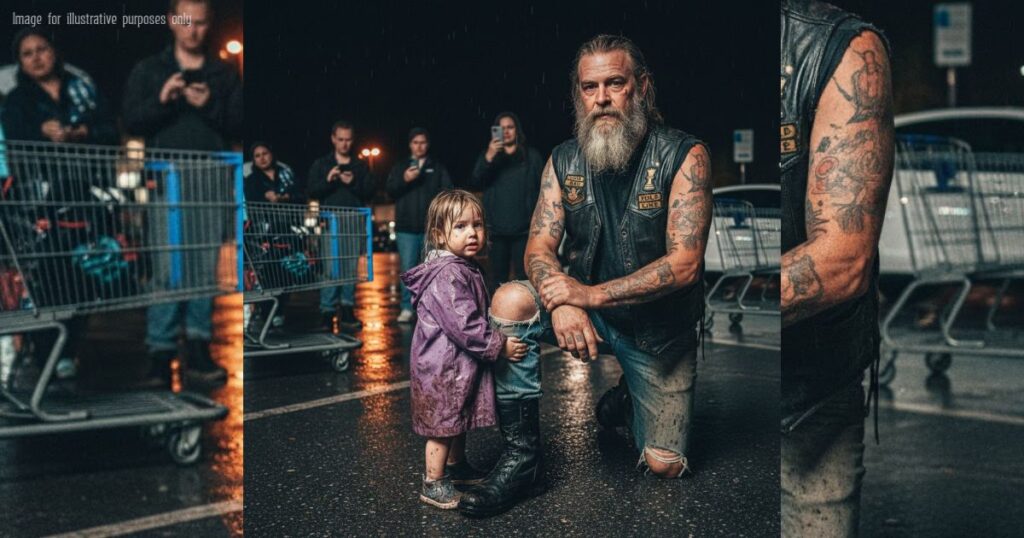“Okay,” I said. “We can’t time travel. But the rest— we know a few tricks.”
Switch tapped his toolbox. “Alternator tomorrow. I’ll ride by.”
Doc nodded. “There’s a therapist I know who takes sliding-scale walk-ins on Wednesdays. I’ll call when the sun’s up.”
Bishop looked at me. We’ve ridden together long enough that words are optional.
“Sunday,” I said to Maya. “You like Sundays?”
She watched my mouth like it was a radio dial. Then: a small nod.
“On Sundays,” I said, “we ride slow. We follow the white lines like they’re rails. We stop for pancakes. Nobody pushes. Nobody pulls. And if you say stop, we stop. You can sit on the bike when it’s quiet and feel it purr like a big sleepy cat.”
Reyna’s eyes filled again. “I don’t want to… I mean, is that… safe?”
“Safer than a lot of things,” Cricket said gently. “We’ll make it quieter than a library. Promise.”
Maya glanced at the coin. Back at me. She moved one sneaker toe exactly onto the edge of the stripe and breathed. “We… hold… the line,” she whispered.
“Yeah,” I said. “We do.”
We started small.
Wednesday afternoons behind the church where the asphalt is smooth and the gulls laugh at you.
Maya would stand on a parking line like it was a balance beam, and I’d idle the bike from one end to the other, a straight slow glide in first gear.
When she lifted a hand, I stopped. When she tapped the coin twice, I killed the engine. When she pressed it to her cheek, I knew to take a step back and give the air more room.
We did not cure anything. We did not fix grief. We made a ritual out of paint and patience. The rest moved inch by inch.
Sunday rides grew.
Four bikes.
Seven.
Twelve.
We learned which diner put two cherries on a kid’s sundae without being asked.
We learned the quietest hours at the library. Switch swapped Reyna’s alternator and refused cash. Doc sat in a waiting room with them and filled out forms no one should have to decode alone. Bishop called a guy who knew a guy who negotiated a rent extension that didn’t feel like a choke collar.
One night a notice bloomed bright red on Reyna’s door anyway.
Maya didn’t scream. She fetched her sidewalk chalk and drew a rook—big block castle—right on the concrete. She stood in its square and placed the coin on the line.
“Don’t move,” she told me. “Please.”
“I’m not going anywhere,” I said. And didn’t.
People will tell you this country is a map of arguments.
Sometimes it is.
But on a damp Saturday, a lot of folks showed up with smokehouse ribs and paper plates and a bucket marked “neighbors.”
Someone brought a folding stage. Someone fixed the porch light. Someone, the same guy who filmed us that first night, walked over and said he was sorry and wrote a number on a check that made Bishop clear his throat.
Maya kept to the stripe by the grill, flipping her coin like she had a tiny sun in her hand. When the band took a break, she climbed onto the low step and touched the mic with a fingertip like it might bark.
“Hi,” she said.
No one breathed.
“My dad told me… if I get scared… find Rook.” She looked at me like you look at the horizon before rain. “He said the rook doesn’t run. He said the rook keeps the line.”
Her mouth made a trembling not-smile. “You kept it. All of you. Thank you for not moving.”
Reyna cried without hiding it. Cricket did, too, and she never does because her mascara costs more than gas. Doc wiped both eyes with a grease rag and claimed he had metal filings in there. Could be true.
Maya hopped down and came to me. She took my hand and wrapped my fingers around the coin, then pushed it back at me.
“This is yours,” she said.
I shook my head. “It lives with you now. I’ve got the patch. And the knees. You’ll be the one reminding me where the line is when I forget.”
She thought about it, the way engineers do. Then she threaded a ribbon through the coin and wore it like a small planet at her throat.
We still ride on Sundays.
We trace the lines.
We stop for pancakes.
Maya talks more now. Not all the time. Not with everyone. But enough to tell us what color the sunrise was and which librarian smiles with her eyes and which diner server writes a star next to her name on the order ticket so the cook remembers extra whipped cream.
Reyna sleeps a little more. The rent got pushed back. The car starts on the first prayer. The notice isn’t on the door anymore.
Sometimes at a red light, Maya leans forward on the seat—helmet bumping my back—so I can hear her over the idle.
“Still holding?” she asks.
“Still holding,” I say.
That’s the job. That’s the code. When storms shake the poles and the wires sing and the world tries to pull itself apart, somebody clamps both hands on the rope and digs in.
As long as one of us is riding, we hold the line.
Thank you so much for reading this story!
I’d really love to hear your comments and thoughts about this story — your feedback is truly valuable and helps us a lot.
Please leave a comment and share this Facebook post to support the author. Every reaction and review makes a big difference!
This story is a work of fiction created for entertainment and inspirational purposes. While it may draw on real-world themes, all characters, names, and events are imagined. Any resemblance to actual people or situations is purely coincidenta


